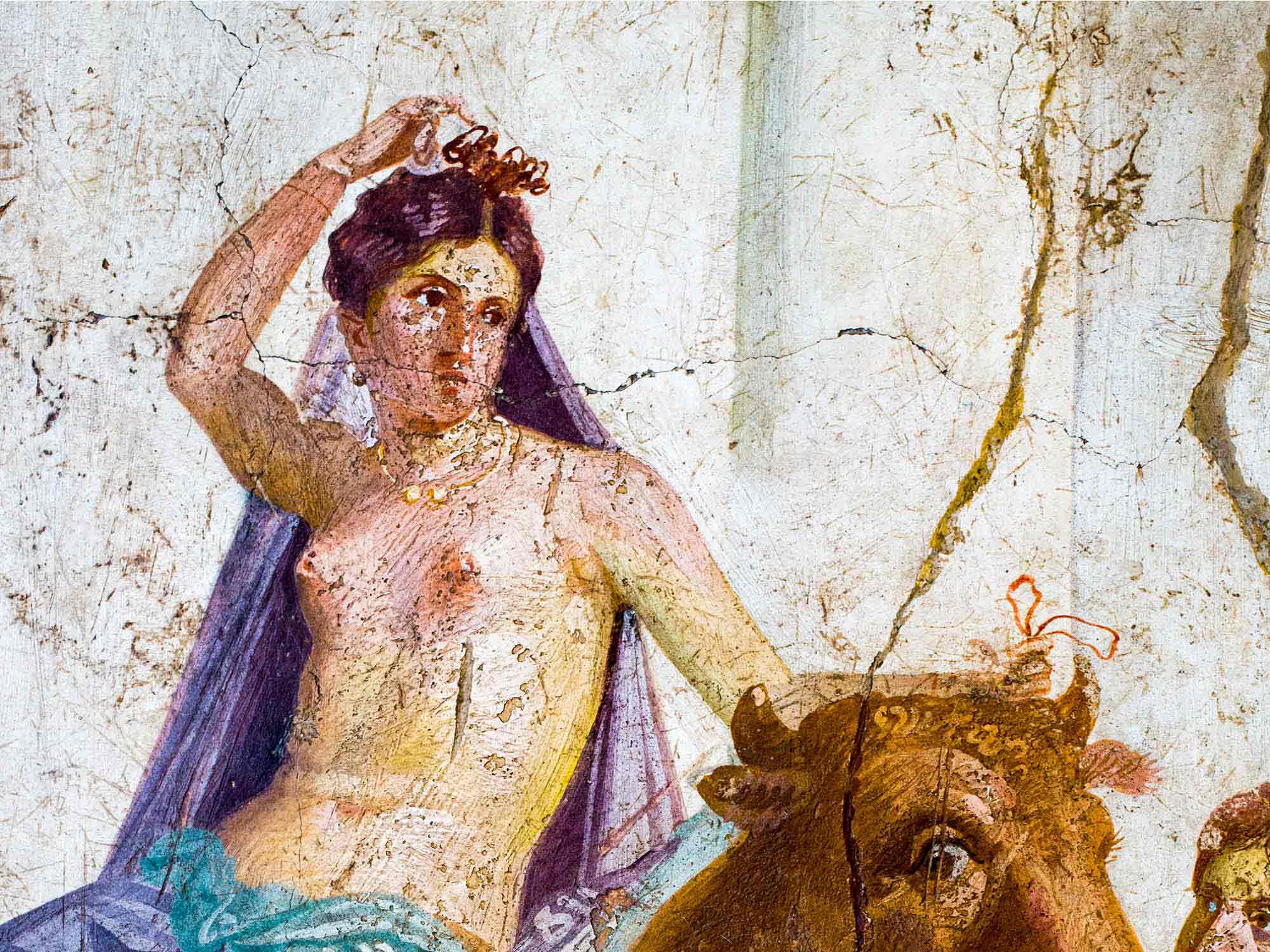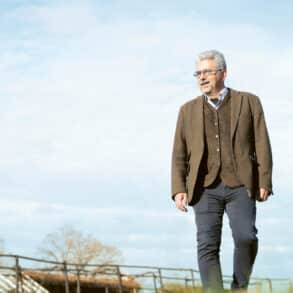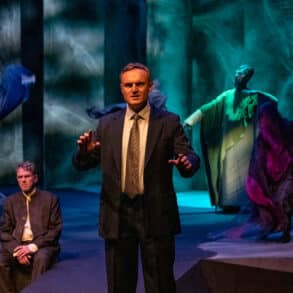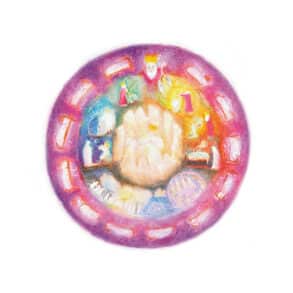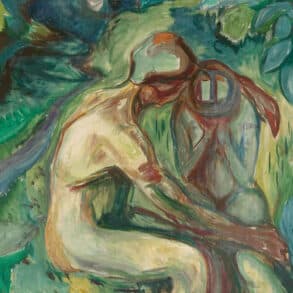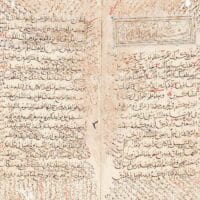Europe is experiencing a crisis, economically, politically, culturally, and spiritually. Perhaps the deeper meaning of the concept “Europa” has never before proved as enigmatic as it does today, between the burden of past debts and dreams (nightmares?), alleged newly acquired power, and a longing for cultural greatness.
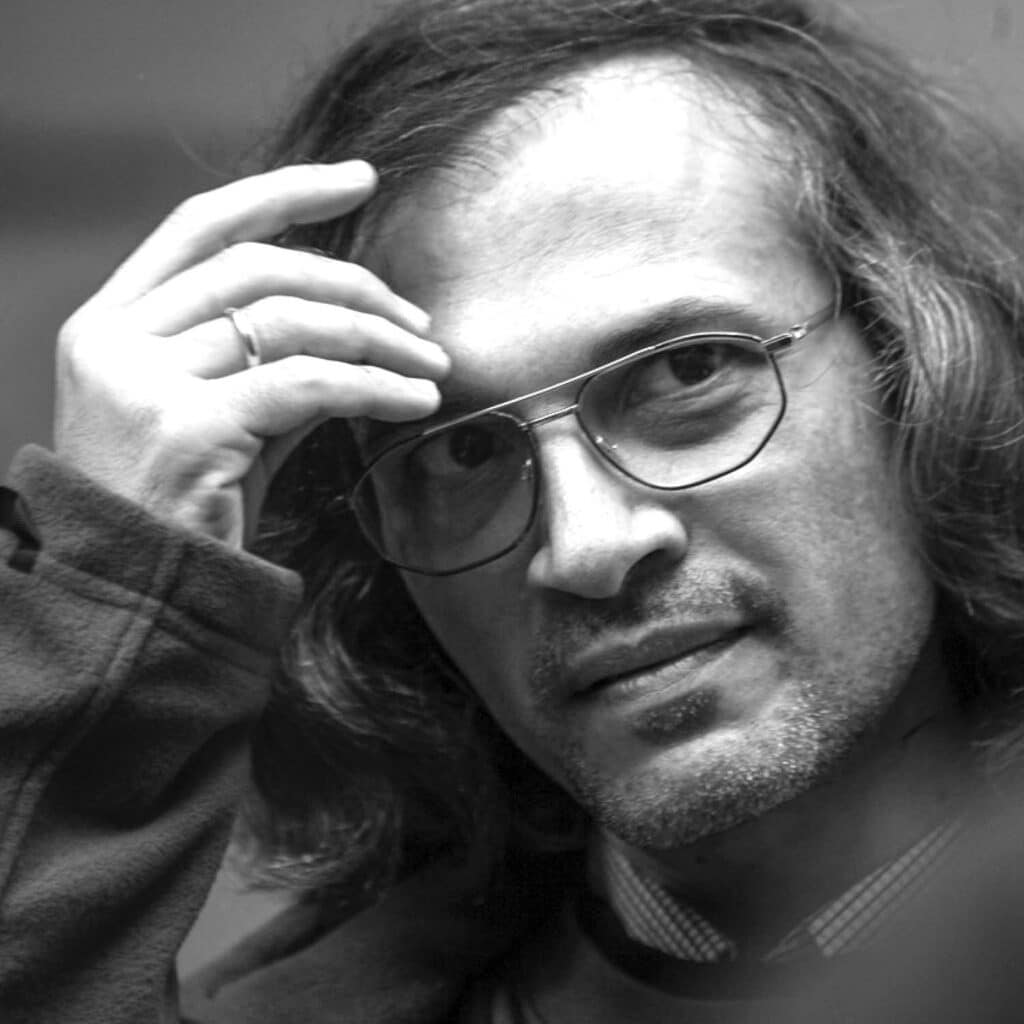
Our present is, in a word, an apocalypse, apokálupsis: it wants to unveil, or is an unveiling (the literal meaning of the Greek word) and will reveal something new. This means krísis (another Greek word), which literally means discernment or decision—that is, crisis as a threshold, the crossing of which requires a free decision to act, which in turn requires free discernment. Today’s world crisis is clearly rooted in certain impulses and tendencies that were either born or decisively developed in Europe and that have influenced and problematically transformed the whole world: materialism, exploitation, nationalism, imperialism, and colonialism. Does this mean that, because of “guilt,” the concept of Europe can and should no longer have any deeper meaning? Or rather, could an unbiased questioning of the deeper meaning of this concept provide fruitful suggestions for dealing with the current crisis?
Eyes of Freedom
Just like apokálupsis and krísis, Europa is also a Greek word. The etymological meaning is debated. I’m convinced by the interpretation “woman with large eyes” (another linguistically less satisfactory, although not absurd possibility is “woman with a wide/broad gaze”). The name Europa seems to point to a cipher that has repeatedly been perceived as characteristic of Europe’s cultural and intellectual history: the focus on visual experience. What does this focus signify? In visual experience, both the perceiving ‘I’ and that which is perceived remain untouched. When two or more seeing ‘I’-beings meet, they are able to perceive one another, through the ability of seeing, without the perception changing the revelation of their own being. Thus, the seeing ‘I’ can perceive another being in its wholeness without either the seeing ‘I’ limiting the independence of that which is perceived or the independence of the perceiving ‘I’ being restricted by the perception. The frontality that manifests itself here is the revelation of a fruitful balance between nearness and distance, in which both the perceiving ‘I’ and that which is perceived can be independently active, without their activity having to disturb, restrict, or distort the Being [Sein] of the other being [Wesen].
In the visual experience, the seeing ‘I’ is free: free to decide, in which modality the encounter takes place; free to shape the encounter as a conversation, in which the encountering beings can understand one another ever more deeply through questions and answers; free to unfold a free activity of one’s own intelligence in the encounter, to behave as a free spirit. Seeing gives us thinking human beings a healthy distance, the prerequisite for a free encounter with phenomena, with the world, with other people.
Intelligence as a Threshold Passageway
Europa, daughter of the Phoenician king Agenor, is abducted by Zeus, the god of cosmic intelligence, who falls in love with her.1 To abduct her, Zeus transforms himself into a white bull, which approaches the beach where Europa is playing. Europa is attracted to the bull and dares to climb onto its back, and the bull swims away from the Asian beach into the open sea to the island of Crete, where the god impregnates Europa. Europa thus becomes the mother of the wise king Minos and the kings Sarpedon and Rhadamanthys. Aphrodite’s influence gives Europa her name.
Does the myth of Europa want to tell us about the divine, cosmic intelligence that fertilizes human beings so that thinking and, thereby, authentic freedom can arise upon the Earth? The still cosmically open and, therefore, female human being here, whose name refers to the freedom-bestowing visual experience, is courageous and ready to enter and traverse the open sea—an image of unending possibilities—to leave her familiar earth without first being able to see the new land. Only after Europa has reached the new earth does divine fertilization take place. In the same way, the birth of a new, no longer only heavenly, but now also earthly intelligence can occur only when the old, solely god-born intelligence is abandoned in order to venture into the open sea of unfamiliar earthliness.
The origin of the Greek word philosophía (love, striving for wisdom) is associated with Pythagoras.2 He undertook a trip from his Asian homeland to the southern Italian city of Croton, a kind of reflection of Europa’s journey, to found his spiritual community, which was to act as the first womb for the birth of philosophy. This trip began the journey that was to lead to the freeing of thought from the guardianship of the gods. Thanks to this trip, thinking became a free, creative questioning in the encounter with the Earth, through which the human being can become the midwife of a new world.
Drama of Freedom
The journey mentioned here leads through the drama of freedom. Europe is the continent where this drama is performed for the first time in a region-wide, radical form, through thinking emancipated from the divine so that the gods and all previously supporting foundations of knowledge, ethics, and community are ultimately declared dead. Europe is, therefore, the continent where the individual first senses themselves as omnipotent. Thereby, free from all determining divine mandates, the individual can conceptualize the purely material, quantitative conquest of the whole world through their own actions, doings, and making but reveal, at the same time, the source of the most radical impotence as a result. It is not by chance that the Greek word drâma literally means the result of acting, doing, or making. (Incidentally, the Sanskrit word karma has the same literal meaning!) And drama, in today’s sense, was born in ancient Greece as the staging of human actions and their consequences.
Europe’s drama of freedom experienced its first culmination when Socrates was condemned to death by a free vote: the human being, who had placed unlimited trust in human thought, in the free love for true wisdom—philosophía!—as the basis of harmonious knowledge and action, and as the threshold to awaken a new experience of the divine within the free human being, must experience the tragedy of a destiny in which his city executes him as a godless man. (In Plato’s Phaidon (115a), Socrates himself hints at the tragedy even before his death.) The karma, so to speak, of this act supported by common law, now, many centuries later, resounds on European soil as the drama of the thinking human being who denies trust to their own free thinking with regard to true knowledge and coherent action and tragically does so precisely with that very thinking. So unconditionally open is the sea upon which we travel now that the thinking human being sees land no longer and convinces themselves (by thinking!) that thinking is without eyes and without view. The great eyes of Europe, which have been fertilized by divine intelligence, appear to go blind in human-effected thinking. This is, however, only the result of the free-thinking individual who, in the experience of their own freedom, initially sees only themselves, only their own inwardness, separated from the world, and, thereby, in thinking, draws the conclusion that intelligence and thinking cannot, in fact, really see anything else. Thus, free thinking, through its own freedom, abolishes itself as something that sees—that thinks!—and abolishes freedom itself as blind illusion. Is this, though, a necessary destiny? Actually, the turning of this destiny is possible at any moment through free action in every awake human being. All that is needed is an unbiased answer to the completely freely formulated question: who decides, beyond all that is given, beyond all objective Being, if not the thinking ‘I’, whether the ‘I’, whether thinking, can yet have eyes?
Would Socrates today, perhaps, ask this very question? His not-knowing did not mean that he declared thinking blind, but rather that he sought to make the eyes of thinking see more and more, to be more and more ‘self-less’: To make the questioning, thinking human being ready, through free conversation (dialogue), to want to act in the encounter with himself and with the world, in every moment, as a mid-wife of the harmoniously new3—not dogmatically dwelling on familiar, past beaches, but rather daring the future-pregnant threshold passage, through the open sea of unbiased thinking. Socrates’ venture can thus be perceived as the elevation of Europa’s mythical journey to the higher octave of free ‘I’-consciousness. The tragic destiny of Socrates was an obstacle to this elevation (one that still has a powerful effect today?). The equally dramatic destiny of free thought shows how Socrates’ venture still belongs today to a decisive future of Europe, which, all the more urgently in this apocalyptic present, longingly strives for unveiling.

Culture Without Centralization
The culture to which Europa gave her name was the opposite of a centralized, abstract, unified one. Greek culture bore no unified state but rather independent cities scattered throughout the Mediterranean region (and the Black Sea), connecting Asia, Africa, and Europe. These cities only formed an externally perceptible community on a linguistic and cultural level, i.e., on the level of spiritual life. They lay by the sea, and many of them were founded by a mother city after long voyages across the open sea. Thus, the mythical journey of Europa appears reflected in the destiny of countless city foundations, sometimes eastwards, sometimes westwards.
Is it only by chance that the long path of philosophy, which led the intelligence of human beings to the discovery of freedom, began from cities that emerged from such foundations: Miletus (Thales, Anaximander, Anaximenes), Ephesus (Heraclitus), Croton (Pythagoras), Elea (Parmenides)? By the way, Athens, the city of Socrates, Plato, and Aristotle, is also located by the sea. The city bears the name of the goddess of intelligence, Athena, who was born from Zeus, the lover of Europa.
The culture from whose womb Europe, philosophy, and free, purely human intelligence were born has been able to permeate the whole world for thousands of years, even though it never formed a politically unified whole. Or, is that, perhaps, precisely why it was able to work so effectively, providing the first language into which, on the one hand, the entire Jewish Bible was translated and through which Christianity first spread (also in Rome!) and on the other, knowledge and science born purely from human forces?
Community or Union?
Can a legal entity that replaced the term “Community” with “Union” in the Treaty of Lisbon,4 even though it shows Europa’s visage on its own banknotes,5 bear the name Europe in honest continuity with the culture that coined this name? Union, which entails unification, reveals a striving for the form of a state entity that should be shaped and dominate all dimensions of life in the name of an abstract unifying law. Can this really be the worthy form that continues Europe’s journey towards the discovery of freedom? Does this form really correspond to a contemporary demokratía, whose law should not impose regulations in all areas of life, but rather make the equality of human beings ever more visible as a possibility for free spiritual development and unfolding, as well as cooperative fellowship in economic relations? Or can this development from community to union perhaps be seen as another tragic episode in the European drama of freedom?
The first experience of freedom is an immediate encounter with the unity of one’s own interiority, which experiences itself as separated from the external and, therefore, free. When this experience becomes one-sided, on the one hand, the separation between inner and outer becomes unbridgeable, and, on the other, the experience of one’s own unity, ever further separated from the world and thereby abstracted, is pre-consciously projected onto the outer world and regarded as the standard for the encounter with the world in all its dimensions. Through this, the experience of freedom is turned into the one-sided experience of an indiscriminate and, therefore, spiritless, fundamentally quantifiable, and calculable equality of all beings, which leads to the illusion of an all-dominating, unifying, formalizing capacity over the dynamics of life. If the experience of freedom only means separation from the world and from other people, then the eye of thinking becomes ever more blind, not only to the freedom of the thinking human being but also to the positive, fruitful experience of individuality, so that the encounter with individuality is ever more seen only as an encounter with competitors and rivals, instead of as a possible threshold to cooperation in fellowship. Has the European drama of freedom reached a point where this blindness in Europe could soon become an all-pervading and organizing legal constitution that only wants to grasp Europe as an ultimately unfree macro-unitary state in relentless competition with other unfree macro-unitary states?6
Dunlop and the Free Spiritual Life
One hundred years ago, Daniel Nicol Dunlop, a European, dared to think that the scenario just outlined need not be the necessary end in the drama of freedom. He initiated the first World Power Conference (“power” meant energy here) as an attempt at global cooperation—a world economic conference which, overcoming the usual competitive dynamics of conventional politics, brought together business (including consumers!) and science, technology, culture—i.e., spiritual life—into a cooperative conversation.7 Dunlop was himself conscious that the fears concerning the future of humanity would only be “satisfactorily overcome . . . when a free and independent spiritual life will be created, from out of which beneficent influences will flow into the economic as well as the political sphere.”8
Dunlop’s intentions show how Europe’s journey to freedom could be continued in harmony with the culture that gave us the name Europe and the discovery of free human thought. The most fruitful impulse of this culture, still the most promising for the future of Europe today, was precisely the capability to experience community on the basis of spiritual life. The continuation of Europe’s journey cannot become humane when the deepest point of descent in the drama of freedom is taken, more and more, as an opportunity to eliminate freedom—perhaps precisely in the supposed name of freedom. Dunlop knew that the development of human beings towards freedom can only progress fruitfully when the deepest point of the descent brought about by freedom does not suggest a return to the past but is transformed into the beginning of an ascent: When free thinking does not renounce its own eyes and remain frozen on familiar beaches out of fear, but rather when it dares to leap into the fertile open sea of spiritual freedom, encountering itself and all human beings with confidence in the human, in the will of the good.
Translation Joshua Kelberman
Image Europa on the Bull, fresco from Pompeii, first century around the time of Ovid, Naples, National Archaeological Museum, Hall LXX. Photo Credit: Marie-Lan Nguyen, CC BY-SA 4.0.
Footnotes
- Sources on the myth of Europa: M. Robertson, “Europe 1,” in B. Jaeger, ed., Lexicon Iconographicum Mythologiae Classicae [Iconographic Lexicon of Classical Mythology], vol. 4, pt. 1 (Zurich: Artemis, 1986), pp. 76–92; J. H. Helbig, “Europa,” in W. H. Roscher, ed., Ausführliches Lexikon der griechischen und römischen Mythologie [Detailed Lexicon of Greek and Roman Mythology], vol. 1, pt. 1 (Leipzig: Teubner, 1884), pp. 1409–1418; J. Escher, “Europe 1,” in Wissowa, Kroll, Mittelhaus, et al., eds., Paulys Realencyclopädie der classischen Altertumswissenschaft [Pauly’s Practical Encyclopedia of Classical Antiquity], vol. 6, pt. 1 (Stuttgart: Metzler, 1907), pp. 1287–1298.
- Burkert’s statements are still relevant here; see W. Burkert, “Platon oder Pythagoras? Zum Ursprung des Wortes ‘Philosophie’” [Plato or Pythagoras? Origins of the word “philosophy”], Hermes 88 (1960): 159–177. [Cf. Christopher Moore, “Introduction: The Origins of Philosophia,” in Calling Philosophers Names: On the Origin of a Discipline (Princeton: Princeton University Press, 2020), pp. 21–24.]
- Cf. S. Lavecchia, “Erkenntnis und Wissenschaft als Geburt der Freiheit: Betrachtungen zu Sokrates’ Hebammenkunst” [Cognition and Science as the Birth of Freedom: Reflections on Socrates’ Maieutics], Perspektiven der Philosophie [Perspectives on Philosophy] 48 (2022): 129–140.
- Treaty of Lisbon, A. Objectives and legal principles.
- European Central Bank, “The New Face of the Euro–Europa,” YouTube, last accessed Aug. 31, 2024.
- On this topic, see Mario Draghi’s speech of Apr. 16, 2024: “Mario Draghi: Radical Change—Is What Is Needed,” Groupe d’études géopolitiques [Geopolitical Studies Group], last accessed Aug. 31, 2024.
- T. H. Meyer, D. N. Dunlop: A Man of Our Time. A Biography, 2nd ed. (Forest Row, East Sussex: Temple Lodge, 2015), ch. 5, “The Impulse of the World Power Conference.
- Opening speech of the Basel Sectional Meeting of the World Power Conference, Aug. 30, 1926, in Meyer (see footnote 7); for the other contents of this speech, alluded to here, see ibid.

